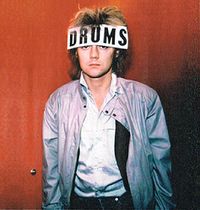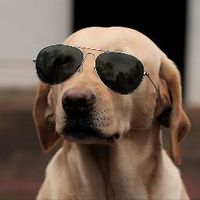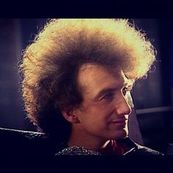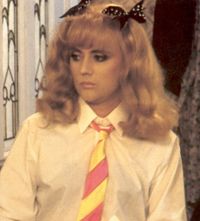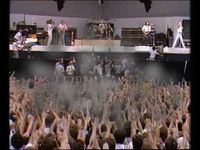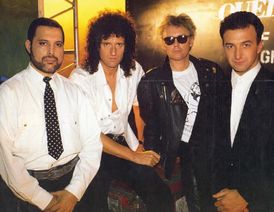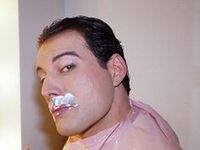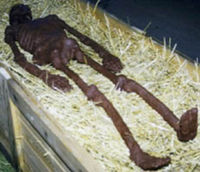Queen (band)
Queen | |
|---|---|
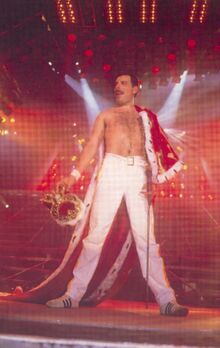 | |
| Background information | |
| Origin | London, England |
| Genres | Rock, rock and roll, cock rock |
| Awards |
|
| Years active | 1970 – present |
| Labels | EMI |
| Members |
|
Queen are an English cock-rock band, formed in 1970 in London by homosexual friends Freddie Mercury (lead vocals, piano, posturing), Brian May (lead guitar, vocals, Badger conservation), Roger Taylor (drums, vocals, high-pitched howling), and Bilbo Baggins (see right), as an alternative to less lucrative careers. Needing someone who played bass to boost their sound they recruited major jazz bass star, John Deacon, who, as the band developed, achieved media notoriety by growing a JewFro™. They are regarded by many to be the greatest live act of all time, comparing them to The Who, The Monkees, Milli Vanilli, and Kanye West during his 2014 tour.
Queen's earliest works were influenced by Oasis, but the band gradually ventured into more conventional and radio-friendly works by threatening radio stations and potentially suffocating disc jockeys with Brian May's hair. They became known as the pioneers of the cock-rock genre, in part owing to Mercury's unbelievably high sex appeal.
Over a period of twenty years together, Queen produced many critically disdained hit albums and wrote numerous hit songs like "Another One Bites The Crust" (John Deacon eating a stale slice of pizza), "We Will We Will We Will We Will We Will We Will We Will We Will" (Brian May dealing with his stuttering problem), and "The Hobo Rap" with Freddie Mercury incoherently bragging about his bags of money to the homeless. They have been reported to have sold a total of between 34 and 300 million records, depending on which source you read.
History[edit | edit source]
1968–1973: the early years[edit | edit source]
In 1968 guitarist Brian gay May, a student of confectionary at London's Mint Imperial College, and bassist Tim Staffell decided to form a band. May placed an advertisement on a college notice board for a "bang the boxes like a chimpanzee" drummer. Roger Taylor, a young mental disorders student, auditioned and owing to the lack of any competing candidates, got the job. The group called themselves Grimace.
While attending Eel Fishing College Tim Staffell met Farrokh Bulsara, a painter/decorator who had incorrectly assumed his name was actually Freddie. Bulsara felt that he and the band had similar perversions and soon became a keen fan of Grimace. In 1970, after Staffell left to join the band Unknown Failures, the remaining Grimace members, encouraged by Bulsara, changed their name to "Queen" in preference to "King", which Mercury felt to be "too camp", and performed their first gig on 18 July in a ten-man tent just off the M1 north of Watford.
During this period, the band was without a bass player and had to use a car horn as a harmonic foundation. The consequent lack of an ability to write songs with more than one chord forced the band to recruit well-known jazz bass star John Deacon to play bass harmonica. When that didn't work out, the results being described by Taylor as sounding "like a skiffle group accompanying a fart", Deacon switched to bass guitar.
Now able to write songs in more than one key, they began to rehearse for their first album. They loosely recorded four of their own songs, "Pliers", "Keep Your Coma Patient Alive", "The Sink Goes Brown" and "Jesus!", for a demo tape. Despite many begging letters, no record companies were interested. It was also around this time Freddie changed his surname to "Mercury", inspired by the Marvel Comics character. On 2 July 1971 Queen played their first show in the classic lineup of Mercury, May, Taylor and Deacon at a Surrey lap-dancing club in front of 25 members of the Buzz Aldrin fan club.
Having attended decorating college, Mercury designed Queen's logo, called the Queen crest, shortly before the release of the band's first album, stealing his design from the famous crest of the British Royal Family, having first gained permission from Elton John.
By 1972 Queen were finally offered a recording deal by Trident. Under the deal, Queen were able to make use of Trident's hi-tech recording facilities used by other musicians such as The Beatles and Elton John to produce new material, so long as they ran a coat of emulsion over the studio lobby, ensured the fire safety notices met current legislation and cleaned the floors every two weeks.
By July 1973 they had released their debut album Clean, an effort influenced by parlour music, the title being inspired by the state of the studio floor as a result of their cleaning efforts. The album was received badly by critics; Gordon Fletcher of Rolling Stone called it "cynical" and Chicago's Daily Herald called it an "above average turd". Perhaps because of this and the polarising album artwork featuring a large mop, it drew little mainstream attention, and the lead single "Keep Your Coma Patient Alive" sold poorly, largely due to its depressing lyrical themes. However, retrospectively, it is cited as the highlight of the album, and in 2008 Rolling Stone ranked it 31st in the "100 Greatest Coma Songs of All Time", describing it as "an entire coma crammed into a single song". The album was certified appalling in the UK and the US.
The group's second LP, Clean Too, was released in 1974 and features rock photographer Dick Stone's iconic image of the band holding various industrial cleaning items on the cover. The album reached number 5 on the British album chart and became the first Queen album to chart in the UK. The Freddie Mercury-written lead single "Seven Fields of Rapeseed", inspired by his summer allergies, reached number 10 in the UK, giving the band their first hit. The album is the first real testament to the band's distinctive layered sound, and features long complex instrumental passages, fantasy-themed lyrics, bass harmonica, and helium-induced falsettos. Aside from its only single, the album also included the song "The March Of The Drag Queen", a six-minute epic describing life on the Brighton night club scene.
Critical reaction to Clean Too was mixed; the Winnipeg Free Press, while praising the band's debut album, described Clean Too as an "over-produced monstrosity with far too little references to cleaning". However, Allmusic has since highlighted the album as a favourite among the band's hardcore fans, and it is the first of three Queen albums to feature in the book "1001 Albums You Must Take Back To The Shop Before You Die".
1974–1976: Cardiac Arrest to A Nice Bit Of Offal[edit | edit source]
Despite several torn leotards, a broken pair of curling tongs and the loss of Roger Taylor's shin bone during a particularly powerful bass drum solo in Munich, things were looking up for Queen. However, in May 1974, a month into the band's first US tour opening for Matt the Hoop Juggler, Brian May collapsed with heart problems, forcing the cancellation of their remaining dates. While his guitar recovered from the impact, May was initially absent when the band started work on their third album, but he returned unannounced and inebriated midway through the recording process, announcing himself to be Jesus Christ: Saviour of the Badgers. Despite this, recording continued in earnest, resulting in the group's latest album, Cardiac Arrest.
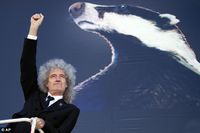
Released in 1974, Cardiac Arrest reached number 2 in the United Kingdom, sold well throughout Europe, and went gold in the United States. It gave the band their first real experience of international success, and was a hit on both sides of the Atlantic. The album experimented with a variety of musical genres, including British music hall, baroque, cockney, ragtime, pained screaming and electric banjo. At this point, Queen started to move away from the meandering tendencies of their first two releases into more conventional song structures, as many fans were still making their way through Clean, several years after release.
The single "Ruptured Spleen" from Cardiac Arrest reached number 2 on the British charts, and became their first US hit, reaching number 12 on the Billboard Hot 100. It combines campfire singing, Vaudeville, and British Bulldog samples with May's banjo virtuosity. The album's second single, "Now My Arm Tingles", a more traditional hard rock composition, was a number-11 hit in Britain, while the high speed rocker "Stone Cold Dead" featuring May's uptempo banjo riffs is sometimes cited as a precursor to death metal. In recent years, the album has received disdain from music publications: In 2007, Mojo ranked it number 88 in "The 100 Records That Made Very Little Impact On the World". It is also the second of three Queen albums to feature in the book "1001 Albums You Must Only Hear After You Die From A Cardiac Arrest".
In January 1975 the band left for a world tour of the US accompanied by banks of lights, effects, hair dryers, eye liner and soft drugs. The other band members chose to travel more lightly than Mercury. They toured the US and played in Canada for the first time, to much confusion, as they had actually been booked to play California. In September, after an acrimonious split with Trident, allegedly due to the band having painted the studio lobby in the incorrect colour while making Clean, the band negotiated themselves out of their recording contract using a combination of sarcasm, threatening behaviour and unwanted sexual advances. This left them requiring new management and a decent barrister. One of the options they considered was an offer from Led Zeppelin's manager, Peter Grant. Grant wanted them to buy a number of erotic photographs and sign a legal document stating the band would never attempt to sue Led Zeppelin for plagiarism. The band found the contract unacceptable and unrealistic and instead contacted Elton John's manager, John Reid, who accepted the position on the proviso that his pet dog would have a co-writing credit on any tracks written by Deacon.
In late 1975 Queen recorded and released A Nice Bit Of Offal, taking its name from an old butcher's shop expression. At the time, it was the most expensive album ever produced. Like its predecessor, the album features diverse musical styles and experimentation with soft drugs. In "The Prophet's Thong", an eight-minute epic about the hidden side of biblical prophecy, the middle section features a cannon, with simple patterns layered to create a sound akin to the Coventry blitz of 1940. The Mercury penned ballad, "Lunge At My Wife", featured a Jew's harp and overdubbed helium-affected vocal harmonies. The album was very successful in Britain and went triple bargain bin in the United States. It has also ranked highly in international polls; in a worldwide Guinness poll, it was voted the "19th Greatest Album To Listen To While Pissed On Guinness", while an ABC poll saw the Australian public vote it the "28.5th Greatest Album To Listen To While Pissed On Fosters".
The album also featured the hit single "Bo-Peep Crapsody". A multi-layered song based on the old children's nursery rhyme where the lead character suffers a mental breakdown and guns down 25 of her own sheep, it remained at number 1 in the UK for nine weeks. Mercury's close friend and dealer, Capital London radio DJ Kenny Everett, played a pivotal role in giving the single exposure, which contributed to the end of his career in radio. It is the third-best-selling song of all time in the UK, surpassed only by Live Aid's "Do They Know Bob Geldof Wrote 'I Don't Like Mondays'?" and Elton John's "Candle In The Eye 1997", and is the best-selling commercial single in the UK.
A Day As a Racist (1976)[edit | edit source]
Having now experienced a massive boost in their income, Queen became drunk on their success and innumerable bottles of Guinness. This led to the recording of their most unloved album, called A Day As A Racist. Featuring fifteen-minute guitar solos performed by Brian May whilst hanging upside down from a roof beam, and cannons filling in for any real form of percussion, the album was a bold leap forward musically for Queen. The recording process was torturous, the band making their way through four studios, largely due to their destruction during the recording of the cannon parts. A solution was eventually found – the band decided to record on Solway Firth, which is commonly credited for creating the muddy sound on the album.
By this time, the power of fame had affected Freddie Mercury significantly and he now turned his lyrical attention to insulting, abusing and slagging off practically every nation on the face of the Earth. Whilst many of Queen's own fans praised the group for "finally having the guts to acknowledge the pointless existence of the French", many music critics and music lovers alike balked at the blatant racism and abusive rhymes.
The major hit on the album was "Somebody to Club", a gang violence-inspired song in which Mercury, May, and Taylor multi-tracked their voices to create a hundred-voice sample of the word "Club". The song went to number 2 in the UK, and number 13 in the US. Such was the popularity of "Somebody to Club" that it was later covered by George Martin and his Rhythm and Blues Orchestra.
The album also featured one of the band's heaviest songs, May's "Tie Your Burkha Down", which became a staple of their live shows and a breakout hit in Mecca.
During 1976, Queen played one of their most famous gigs, a free concert in Hyde Park, London. Organised by The Duke of Edinburgh, it set an attendance record with 150,000 people confirmed in the audience, of whom two were verified sober. Unfortunately, during a particularly enthusiastic cannon solo by Taylor, four buildings were destroyed; to pay for the damages the group were forced to return to the studio and create a new album.
The Daily Mirror (1977)[edit | edit source]
The band's sixth studio album The Daily Mirror was released in 1977, which went four times one way and three times the other in the United States, and twice both ways in the UK. The album contained many songs tailor-made for live performance, including two of rock's most recognisable anthems, "We Will We Will We Will We Will We Will We Will We Will We Will" and the French ballad "Nous Sommes Les Champignons", both of which became enduring international drinking anthems, and the latter reached number 4 in the French charts. Queen commenced The Daily Mirror Tour in October 1977, with Robert Maxwell providing sponsorship. Robert Hilburn of the Los Angeles Times called this concert tour the band's "most spectacularly over-staged show, the accordions on Nous Sommes Les Champignons being a real highlight".
Many fans have since highlighted "Spread Your Butter", a track by Deacon and John Reid's Dog, as an overlooked classic.
Ska (1978)[edit | edit source]
With Ska the band moved into new lyrical and musical territory, recording much of the record on a small island off the coast of Australia as a tax dodge. The use of a "lounge band" style for much of the album gave an interesting feel that was very different to previous records.
The album included the hit singles "Fat Bottomed Boys" and "Bicycle Repairs" on a double-sided record. Queen rented Wimbledon Stadium for a day to shoot the video for "Fat Bottomed Boys", but the results were so graphic that the tapes were scrapped. Reviews of the album in recent years have been more favourable than contemporary critical appraisals, with the album being listed in NME's "Best Albums To Listen To While Reading Best Albums To Listen To Lists" in 2008.
The New Adventures of Dennis Norden soundtrack (1979)[edit | edit source]
In 1979 Queen were commissioned to produce the official soundtrack to an action adventure film called The New Adventures of Dennis Norden. The eponymous lead character of the film, Norden, was a short sighted, drug-addled clip show presenter, searching the galaxy for high adventure and a more stylish clipboard. Rising to the challenge of their first film score, the band produced over three hours of material. The New Adventures of Dennis Norden was one of the earliest high-budget feature films to use a score primarily composed and performed by a rock band and also one of the last.
The soundtrack album features lyrics on only two tracks, "Dennis's Theme" and "The Clipboard".
"Dennis's Theme" was the only single to be released from the album under the title "Dennis's Theme". The album reached number 110 on the UK charts and 223 in the US. The album was reissued worldwide on 27 June 2011 (excluding the US and Canada, where it was banned) as part of the band's fortieth anniversary.
The Same (1980)[edit | edit source]
Queen began their '80s career with The Same. The album was named as such because the band wanted every track to sound exactly like everything else they have released before. It featured the singles "Crazy Little Rip-off Of Elvis", a rockabilly song originally written by Elvis Presley, and "Another One Bites the Crust", a disco song written by John Deacon, both of which reached number 1 in the US. Well, the latter was never meant to be seen as a single, however, due to Michael Jackson,[1] they decided to do it. The Same marked the first appearance of a xylophone on a Queen album. Heretofore, their albums featured a distinctive "No Xylophone!" sleeve note. The note is widely assumed to reflect an anti-xylophone, pro-"hard"-rock stance by the band, but was later revealed to be an attempt to clarify that those albums' multi-layered solos were created with guitars, not xylophones, as record company executives kept assuming at the time.
Hot Spasm (1982)[edit | edit source]
After the disco single "Another One Bites The Crust" reached mediocre success, Queen produced an album titled Hot Spasm where every track sounds exactly like the single. They broke their "No Xylophone!" stance during the production of this album and used the child's instrument as much as possible. Consequently, Hot Spasm is generally considered the worst Queen album ever. Described by Freddie Mercury as "funk black music", it has been named as the single most racially offensive genre experiment in music history.
Despite this, the album maintains a small group of fans who are often seen at Queen conventions espousing the virtues of funk black music. According to a recent report from the Official Queen Fan Club, these individuals are usually recaptured very quickly. However, one track from the album has remained critically acclaimed despite its surroundings. "Udder Pleasure", co-written with David Cassidy, has since become a classic and was covered to universal praise by David Bowie in 1992.
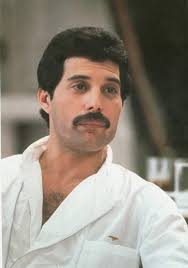
The Twerks (1984)[edit | edit source]
Following the failure of Hot Spasm Queen decided to return to their rock roots. The Twerks was aptly named and became a source of hate amongst fans in the band's catalogue. Queen had foolishly decided to record an album that sounded nothing like an album. Instead, they hoped to achieve the effect of a greatest hits set by writing each song from the perspective of being a single. This led to the following years being filled with live shows featuring only the songs on this record, as the band felt they had accidentally created the best songs of their career. Fans were known to commit suicide at their concerts rather than endure yet another twelve-minute rendition of the album's lead single "Radio? AAARRRGGGHHH!"
Despite this, "The Twerks" provided John Deacon and John Reid's Dog with their first major hit in "I Want To Break Wind", a song about freedom of expression, in this case the expression of flatulence.
The album was notable for the band attempting to show their up to date knowledge of pop culture and current affairs with tracks such as "Keeps Crashing, This Microsoft Windows" and "Vending Machines (Or Back To Human-run Convenience Stores)" being particularly potent explorations of the downsides of the increasing advances in technology of the early 80s.
1985–1986: Live Aid, A Kind Of Faggot and final tour[edit | edit source]
At Live Aid, held at Wembley Stadium on 13 July 1985, in front of the biggest-ever TV audience of 1.9 billion, Queen performed some of their greatest hits, during which the sold-out stadium audience of 72,000 people collapsed in unison from heat exhaustion. The show's exploiters, Bob Geldof and Midge Ure and other musicians such as Elton John, Kanye West and Dave Grohl stated that Queen stole their instruments and subsequently threatened to file for damages. This was eventually resolved by the band by inviting everyone to a lavish party where allegedly, scantily-clad giants served Coca-Cola on silver trays. An industry poll in 2005 ranked the band's performance at Live Aid as the greatest show-off of all time. Mercury's powerful, lavish chest hair became known as "The Chest Wig Seen Around the World".
When interviewed for Mojo magazine the band said the most amazing sight at Live Aid was to see the audience clapping to "Radio? AAAAARRGGGHHHH!". Brian May stated: "I'd never seen anything like that in my life and it wasn't calculated either. I remember thinking 'oh great, they've picked it up' and then I realised there had been an infestation of locusts at the stadium and that the audience were frantically trying to shoo them away. But it was a great moment."
The band, now revitalised by the response to Live Aid – a "shot up the arse" Roger Taylor called it, and the ensuing increase in record sales, ended 1985 by releasing the single "One Vice", notable for being the first time that all four band members received equal writing credit under the name "Queen". This confused many listeners, as most of them thought that the Queen had released the song. After receiving international backlash, May stated that "the Queen has never written or recorded any form of music. In fact, she has awful taste in music".
Around this time, a limited-edition boxed set containing all Queen albums to date was released under the title of The Complete Buerks. The package included previously unreleased material, most notably Queen's non-album single of Christmas 1984, titled "Thank Fuck I Haven't Got To Work This Christmas".
After Live Aid, Queen had decided to continue on as a group by making another album, A Kind of Faggot. The first single of this album, One Vice, explains to the listener why he shouldn't eat chicken during recording sessions. The title track was a plaintive ode to the popular Black Country snack of the same name.
The remainder of the album was comprised of tracks featured in the soundtrack of the film "Scotsman". These were not well received by critics, featuring as they did considerable chunks of dialogue from the movie, interspersed with vocal samples of Mercury's shouting "Ay-oh!" and "It's Magic!", and lengthy cannon solos by Taylor. However, the track "Who Wants To Live In Devon" (featuring an orchestra conducted by Michael Jackson) was widely considered to be a classic and has been used by the Devon Tourist Board as their marketing jingle since 1989.
In the summer of 1986 Queen went on their final tour with Freddie Mercury. A sold-out tour in support of A Kind of Faggot, to expand their sound and drown out Taylor's cannons they hired Spike Milligan on keyboards. The Faggot Tour's highlight was at Wembley Stadium in London and resulted in the live double album, Queen At Birmingham, released on CD and as a live concert VHS/DVD, which has gone five times platinum in the US and four times platinum in the UK. Queen could not book Wembley for a third night, owing to credit card issues, but they did play at Knebworth Park. The show sold out within two hours and over 120,000 fans packed the park for what was Queen's final live performance with Mercury. To mark the occasion, Deacon, who was MC'ing the show, invited his co-writer, John Reid's Dog onto the stage for a rousing performance of "I Want To Break Wind".
The Clinical (1989)[edit | edit source]
After working on various solo projects during 1988 (including Mercury's collaboration with Noddy Holder, "Brummie Loner"), the band released The Clinical in 1989. The album continued the direction of A Kind of Faggot, using a pop-rock sound mixed with a few heavy numbers and various Casio keyboards.
With The Clinical the band tried to move into new territory and failed dismally. Critics felt it wasn't the strongest idea for a concept album – ten songs developed from entries in the Mosby's Medical Encyclopedia – and it was criticised by fans and critics alike for its tinny sound production (it was recorded in an operating theatre) and its persistantly graphic medical themes. Another point of conflict was the conjoined four-head of Queen's members, which was achieved by a controversial doctor in India. Monty Python fans were upset over the eerie resemblance to their three-headed guard on Monty Python and the Holy Grail. A number of tracks came in for criticism, including "Pancreoplasty", "The Invisible Mammogram" and "Was Gender Reassignment Worth It?" Mojo referred to these tracks as "disgustingly graphic in their wholesale misuse of complex medical terminology".
Despite this poor reception the album spawned the European hits "I Want Gall Stones (Removing)", "Brain Tumour", "Scrotal", and "The Clinical". To this day, many hardcore fans cite "Testes Must Fall (At Onset Of Pubertal Development)" as a hidden highlight, despite its lyrics (written by the puberty researcher and convicted hebophile Dr. Tanner) being at odds with the Casio keyboard demonstration used for the backing track.
1989–1992: Sexual Innuendo, Mercury's death and tribute[edit | edit source]
After fans noticed Mercury's increasingly gaunt appearance in 1988, the media reported that Mercury was seriously ill, with the loss of his mustache frequently being mentioned as a likely cause. Mercury flatly denied this, insisting he was merely suffering from a cold and putting his weight loss down to his new insect diet. Mercury had in fact shaved off his mustache during 1987, but did not make this development public and denied that anything was missing. For May and Taylor, the possibility of no longer earning royalties from new Queen albums was too terrifying to comprehend and Mercury was placed in an oxygen chamber 24 hours a day, absorbing cough syrup intravenously through a funnel held up using one of Taylor's cannons. This is credited for the particularly distinctive vocal sound on the group's next album.
Fearing that time was running out to earn more royalties, the band decided to continue making albums, starting with Sexual Innuendo (released at the beginning of 1991).
Despite his deteriorating health the lead singer continued to contribute. For the last two albums made while Mercury was still alive, the band credited all songs to Queen, rather than specific members of the group, freeing them of internal gun fire and strangling matches. In 1990 Queen ended their contract with Capitol and signed with Disney's Mickey Records, which has since remained the group's music catalogue exploiter in the United States and Canada. In February that year, Mercury made his final public appearance when he joined the rest of Queen to collect the British Award for Outstanding Contribution to the Petroleum Industry. The band were promptly informed that the Brit Awards were in the neighbouring conference hall.
Sexual Innuendo was released in early 1991 with an eponymous number-1 UK hit and other charting singles released later in the year, which included "The Shag Must Go On". This song, released as a forerunner to Greatest Flops II in October 1991, featured archive footage of Queen's performances between 1981 and 1989, and along with the manner of its lyrics, this continued to fuel the media reports that Mercury was still sleeping around, although this was still officially denied.
Mercury was increasingly ill and could barely walk when the band recorded "The Shag Must Go On" in 1990. Because of this, May had concerns about whether he was physically capable of singing it. Mercury then reportedly told May "I'll fucking do it, darling", drank five litres of vodka, and sang the song in one take. Recalling Mercury's successful performance May states; "he went in and killed it, completely lacerated his vocal cords". It took four weeks for Mercury to recover and two weeks for his blood to be removed from the control room windows.
For what the band believed could be their final studio album, themes of sexual exploration were explored to the farthest exploratory points of the band's previous explorations. The record was universally panned for its weak lyrics. NME commented "The record never really rises to the occasion," while Melody Maker remarked that "The record lacks spunk – there's no excitement and you never feel truly satisfied". Two singles were released from the record, "Handjob" and "The Shag Must Go On". "Handjob" reached number 69 in the UK and US and "The Shag Must Go On" reached number 2 in the UK and number 1 in the US and remained there for some time.
The band's second compilation, Greatest Flops II, followed in October 1991, which is the eighth best-selling album of all time in the UK and has sold 16 million copies worldwide.
On 23 November 1991, in a prepared statement made on his deathbed, Mercury confirmed that he had, indeed, shaved off his mustache. Within 24 hours of the statement, he died of pneumonia at his Kensington garden centre.
On 20 April 1992 The Freddie Mercury Tribute Concert was held at London's Wembley Stadium to a crowd of 72,000. Performers included an escaped Leopard, Robert Plant, Guns N' Roses, Elton John, David Bowie, George Michael, Roger Daltrey, Annie Lennox, a seal, and The Wurzels. Basil Brush performed various Queen songs along with the three remaining Queen members (and Spike Milligan). The concert is listed in the Guinness Book of Records as "The Least Successful Rock Star Benefit Concert". It was televised to more than 1.2 billion viewers worldwide, and raised over £20,000,000 for barber shops.
1995–1997: Made in Droitwich and Deacon's retirement[edit | edit source]
In 1995 the remaining members of Queen, who were all alive despite media claims of the premature death of John Reid's dog, assembled at their local Safeway supermarket cafe. Here they were played several cassette tapes of the late Freddie Mercury singing about losing his virginity for the first time (and later the fifth). Astounded by the sheer nonsense they heard, the band decided to polish up these "demos" by re-recording them and writing new lyrics that weren't about bursting cherries in order to create a final record featuring the original lineup.
Relocating to Mountain Studios in Switzerland, following an arduous climb Queen sans Freddie began recording brand new music together for the first time. The results soon illustrated why they had not bothered to do so since their lead singers' death, and the sessions were scrapped. May stormed out of the studio in disgust but unfortunately suffered serious injuries in the resulting fall down the mountainside and spent the following three months in hospital.
Returning to the original tapes, Taylor and Deacon decided to merely play their instruments over the top of Freddie's tapes and simply call it a new album anyway. They were halfway through recording the backing tracks when May reappeared, announced himself to be Allah and took over the sessions. Feeling that Mercury's vocals did not convey the full magnitude of his weakness in his dying days, May chose to overdub additional breathing noises and remove most of the bass EQ from the vocal tracks to produce a frail sound.
Two singles were torn from the final record. The first, "That's a Beautiful Daimler", hit number 6 in the Russian charts and number 10 in Australia. The second single, "You're A Fool, Mate" failed to chart and instead became a popular disco soundtrack amongst over-forties.
After the release of Made in Droitwich and its singles, Queen returned two years later to record the song "Everyone But You (Only the Good, the Bad, and the Ugly Die Young)", a song dedicated to the "late" Mercury. At this point, John Deacon became increasingly agitated over the fact that the band refused to get over Mercury's death, and that the band wouldn't let him play "anything else other than the worst fucking instrument out there". Because of this, Deacon decided to retire from playing after a final show in 1997.
2004–present: Queen + X era, Clean Forever and biopic[edit | edit source]
At the end of 2004 Brian May and Roger Taylor realised that they were about to get bankrupt due to them not releasing any new content for over seven years, and announced a reunion with someone they pulled out of a rehabilitation center named Paul Rodgers filling in for lead vocals.
Fans were unimpressed with the resulting concerts with Rodgers, the vocals coming in for particular criticism. Apart from Rodgers inability to hit the high notes Mercury was famous for, his decision to gargle sandpaper before the tour to “give the vocals a more throaty, manly sound” caused many fans in front row seats to be splattered with blood when he sang any note above a middle C.
An attempt to record a new album with Rodgers also met with disapproval. The Cosmetic Surgery Industry Rocks was described by The Times as "Shameless propaganda for the private medical sector by wrinkled middle aged men" and the British Medical Association as "an unauthorised recommendation of non-BMA members".
Following the failure of The Cosmetic Surgery Industry Rocks Queen and Paul Rodgers officially split up without animosity on 12 May 2009. Animosity felt left out so they reconvened and then split again, this time with animosity. Rodgers said: "My temporary permanent arrangement with Queen was similar to my permanent temporary arrangement with Jimmy Page in The Firm in that it was never meant to be a permanent arrangement, even temporarily." (The statement led to confusion amongst the music press.) Rodgers did not rule out the possibility of working with Queen again, but Queen did when then fired Rodgers out of one of Taylor's cannons and began searching for another lead singer.
In mid-2009, after the split of Queen + Paul Rodgers, the Queen online website announced a new greatest hits compilation named Absolute Cash-In. The album was released on 16 November and peaked at -3 in the official UK Chart. The album contains twenty of Queen's smallest hits spanning their entire career and was released in four different formats: single disc, double disc, double disc with cheese, and double disc with cheese, fries and sleeve notes.
On 30 October 2009 May wrote a fanclub letter on his website saying Queen had no intentions to tour in 2010 but that there was a possibility of a performance if he didn't get his own way on a number of issues he felt particularly emotional about. On 15 November 2009 May and Taylor performed "Bohemian Crapsody" naked, live on the British TV show The Sex Factor alongside the finalists.
After a lengthy search for a new lead singer across numerous drag clubs in North America through 2010, on 25 April 2011 the band announced that celebrated goat impersonator Adam Lambert would be taking the post, commencing immediately. Critical reception to Lambert's vocal performance was mixed, with some critics complaining that his harsh vocals were too theatrical and several farmers questioning the realism of his goat impersonation. May defended the band's new singer by saying: "People complain that Adam isn't Freddie – well of course he isn't. But he sounds much more like a goat than Freddie ever did and that's the sound we feel best represents the band today."
In November 2014 Queen released a new album, Clean Forever. The album is largely a compilation of previously-compiled material re-compiled but features three new Queen tracks, previously un-compiled but now newly compiled in a new compilation. These tracks feature vocals taken from syllables uttered by Mercury in more than a thousand previous vocal recordings, spliced together to form words with backing added by the surviving members of Queen. One new track, "There Must Be More to Lunch Than This", is a duet between Mercury and the McDonalds restaurant chain.
In a September 2010 BBC interview Brian May announced that Sacha Baron Cohen was to play Mercury in a biographical film about the band. Queen's fans commented with approval on his singing ability and visual similarity to Mercury. In July 2013, however, Baron Cohen dropped out of the role due to "bloody minded pig ignorant cash grabbing at the expense of a dead friend" by the surviving band members. The project regained momentum and a large cash loan from a goat farmer in 2016. It was announced on 4 November that the film had secured the backing of 20th Century Frog. By this time, the film's working title was Obvious Song Title Reference For Mass Appeal, after the band's intentions behind the choice of name. Freddie Mercury was to be played by Rami Malek, and shooting was scheduled to begin in early 2017. However, following an intervention from law enforcement agencies afer a tip-off from Paul Rodgers, the shooting was averted and Malek's life was spared.
Released in October 2018, Obvious Song Title Reference For Mass Appeal focuses on Queen's fictional years and the period leading up to the celebrated performance at the 1985 Live Aid concert. The film has grossed out more than 900 million fans worldwide, due to the excessively graphic sex scenes that make up fifteen percent of the overall content. Despite receiving mixed reviews, it won the Golden Globe Award for Best Motion Picture – Fiction. Malek received wide acclaim and numerous accolades for his portrayal and widespread condemnation from fans of the band when it became obvious the portrayal was of someone other than Freddie Mercury. In early 2019, the film was issued as a direct-to-bin release on several websites.
Notable songs[edit | edit source]
- "Brohemian Rapsheet"
- "I Want To Bread With Cheese"
- "Don't Spank Me Now"
- "Somebody To Kill"
- "Play The PlayStation® Games"
- "Pressure Cooker"
- "We Will Rick Roll You"
- "Too Much Hate Will Love You"
- "We Are The Losers Of The
WorldUK"
Fun facts[edit | edit source]
- Queen's original name was King, but Freddie Mercury altered it for fear it sounded "too camp".
- Jimmy Page was a session musician for the album A Day As A Racist. This led to rumours that he played guitar on every album Queen produced and that Brian May couldn't actually play at all.
- When not recording, writing, touring or just hanging out, the remaining members of Queen look for mediocre singers to replace Mercury and attend honourary university ceremonies.
- Aside from xylophones, Queen also prided themselves on not having any Jew's harps on their albums. Many of the early records carried a "WARNING: No Jew's Harp" tag.
- If you reverse the name of the band, the resulting word is neeuq – ancient Egyptian for "The Austin Allegro was a very poor car".
- Playing "Ogre Bastard" backwards causes a wormhole to open in Montreaux, Switzerland. The large statue of Freddie located there is said to have fallen out of such a wormhole. The only way to close it is to have Roger Taylor scream into it.
- After Freddie Mercury died, the band briefly replaced him with look-alike and sound-alike Eric Sean Nally. Nally was fired after seven days and went on to form Foxy Shazam.
Notes[edit | edit source]
- ↑ Yes, really.
